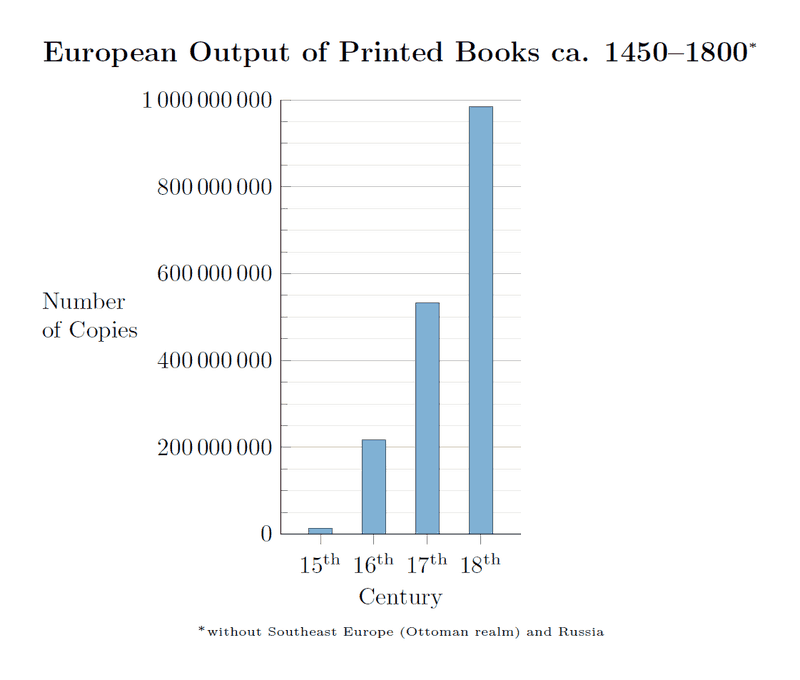The Best Way to Consume Information – Of Dollars And Data
How to Combat Information Overload

It was 1439 when arguably the greatest invention in human history came into being—the printing press. Though the printing press had been independently invented in South Korea a century prior, it was Johannes Gutenberg’s moveable type that hoisted Europe out of the Dark Ages and into the Renaissance and beyond. Elizabeth Einstein, author of The Printing Press as an Agent of Change, stated that the printing press was “a decisive point of no return in human history.”
With expanded access to information, Europeans were able to share discoveries, copyright materials, and spread ideas at a rapid pace. If you look at the number of books printed in Europe since the introduction of the printing press, you can see this well:

And this trend continues today. With the advent of the internet, the democratization of information has progressed more rapidly than ever before in human history. And with this abundance, a new problem has emerged. Whereas centuries ago we used to have trouble finding information, now the issue is filtering it. As Elizabeth Einstein notes:
There appears to be little reason to be concerned about ‘the loss of mankind’s memory.’ There are good reasons for being concerned about the overloading of its circuits.
This is the question of our time. How do we know what information is useful and what isn’t? How do we separate the signal from the noise? As James Gleick said in The Information:
When information is cheap, attention becomes expensive.
So, how should you spend your limited attention? Is there an optimal way to consume information?
I have thought about this problem a lot because I spend so much of my time consuming information. Between my job as a data scientist and writing this blog, I am constantly in a state of information consumption. This is why I read 40-50 books a year. No TV. No sports. No video games. I read.
And after doing so much reading, I have realized that there is an optimal way to consume information. You should focus on the information with the longest shelf life that took a considerable effort to create.
Why do these two criteria matter? Because, despite how you may feel, your time is your most important asset. So you shouldn’t waste it on information that will be outdated soon. “Here’s How the Trade War Will Affect Your Portfolio” has a low shelf life compared to “5 Lessons I Learned From People on Their Deathbeds.” While both may not be that useful to you, one of these articles, in theory, can teach you something that you can use for the rest your life (i.e. the content is more evergreen).
Additionally, you want to consume content that took high amounts of effort to create because it gives you the most bang for your buck. This is why I almost exclusively read books and spend much less time on other information mediums. Let’s use an example to see why.
In the late 1980s, Michael Lewis wrote Liar’s Poker over the course of 18 months. If we assume that he worked full time on it over that time period (~2,000 hours per year), this means it took Lewis 3,000 hours to finish the book. Right now on Amazon you can buy the paperback version of Liar’s Poker for $11.24.
If you divide the time Lewis took to write Liar’s Poker by the price you paid for it, you are paying Lewis less than $0.004 per hour to write Liar’s Poker. That’s less than half a cent per hour to have one of the greatest finance writers in history do research and write a compelling narrative for your reading pleasure.
This math is roughly consistent across other great works as well. For example, The Power Broker by Robert Caro took 7 years to write and can be purchased for $23.40 on Amazon. If you assume he worked full-time while writing it, then it would cost you less than 1/5th of a cent per hour of Caro’s time.
The amount of effort compared to the price you pay is astounding. Where else can you learn that money likely won’t be your biggest issue in retirement for so cheap? Where else can you spend so little to understand what it really takes to get rich and the costs associated with doing so? Where else can you get such a phenomenal deal?
In books. No informational medium does this as well on a consistent basis. But don’t just take my word for it. Consider what Warren Buffett, arguably the greatest investor in history, said about the power of reading:
Read 500 pages everyday. That’s how knowledge works. It builds up like compound interest.
Now, of course, not all books are created equal. So, how do you decide on which ones to read? Find those people that have recommended good books to you before and follow them on social media, email. etc. Find out what they are reading and where they get their book recommendations.
What About _____?
I already can sense that you might have some questions. What about blog posts? What about podcasts? What about TED talks? Are you saying that we should only read books?
No. Not at all. As I stated before, my information consumption philosophy is based on two criteria (1) long shelf life and (2) high effort. Books tend to have more of both than other informational mediums, on average. This is because it is far harder to publish a book than to write a blog post or to do a podcast. This doesn’t mean that these other mediums aren’t worth your time, just that you are more likely to find value among those mediums that require more effort.
And while effort isn’t a perfect predictor of information quality, it is a decent proxy. For example, The Power Broker is 650,000 words and took ~14,000 hours to write. That’s 46 words created per hour. Liar’s Poker has 80,000 words and took 3,000 hours to write, or 27 words created per hour. Both very high quality books. I write a 1,000 word blog post each week that takes about 10 hours, or 100 words created per hour. Big differences in quality, but, then again, I write this blog on the side for free.
Writing time isn’t everything though, because I know Josh Brown or Matt Levine could crank something out in far less time than myself and it would be higher quality. In their cases, their quality comes from their multi-decade careers in finance. Their effort doesn’t show up in their writing time, but their ability to stay in an industry for a long time and understand it well.
But no matter how you measure effort, where it exists you are likely to find great information. If you are in need of some more great reading material, check out my Amazon Influencer page where I keep an updated list of my favorite books by category. Thank you for reading!
➤ You can follow Of Dollars And Data via Twitter, Instagram, or my weekly newsletter (Sign up here!)
This is post 140. Any code I have related to this post can be found here with the same numbering: https://github.com/nmaggiulli/of-dollars-and-data




